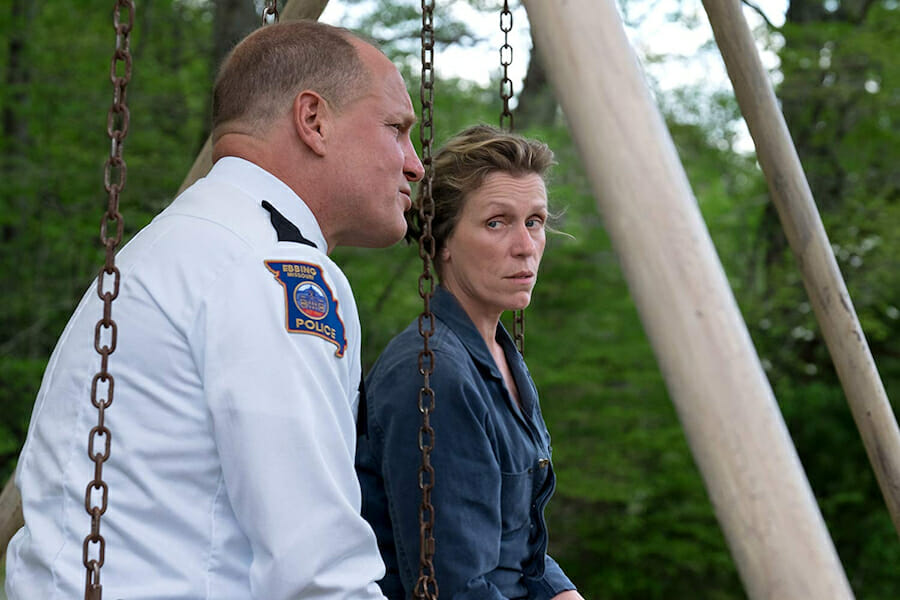
‘Three Billboards Outside Ebbing, Missouri’ Review
Once out of our teen years (though some take a bit longer), the vast majority of us accept the obvious truth to the adage “life is not fair.” Despite this, we never outgrow our desire for justice when we feel wronged. In Three Billboards, uber-talented playwright/screenwriter/director Martin McDonagh delivers a superb drama blended with a type of dark comedy that allows us to deal with some pretty heavy, and often unpleasant small town happenings.
Oscar winner Frances McDormand plays Mildred, a grieving mother whose daughter was abducted and violently murdered. With the case having gone cold, Mildred is beyond frustrated and now desperate to prevent her daughter from being forgotten. To light the proverbial fire and motivate the local police department to show some urgency in solving her daughter’s case, Mildred uses the titular billboards to make her point and target the Police Chief Willoughby (Woody Harrelson).
The billboards cause quite the ruckus as the media brings extra attention, which in turn creates conflict between Mildred and the police department, the town citizens, and even her own son (Lucas Hedges). The film could have been titled ‘The Wrath of Mildred’ if not for so many other facets to the story and characters with their own layers. Her anger is certainly understandable, though some of her actions are impossible to defend. Things can never again be square in the life of a parent who has lost a child, yet vengeance is itself a lost cause.
Mr. McDonagh’s exceptional script utilizes twisted comedy to deal with the full spectrum of dark human emotions: managing the deepest grief, anger, guilt, and need for revenge. As in his Oscar winning script for the contemporary classic In Bruges (2008), his dialogue plays as a strange type of poetry, delivering some of the most harsh and profane lines in melodic fashion. In addition to his nonpareil wordsmithing, Mr. McDonagh and casting director Sarah Finn have done a remarkable job at matching many talented performers with the characters – both large roles and small.
Following up her Emmy winning performance in “Olive Kitteridge,” Ms. McDormand is yet again a force of nature on screen. She would likely have dominated the film if not for the effectively understated portrayal by Mr. Harrelson, and especially the best supporting performance of the year courtesy of Sam Rockwell. His Officer Dixon is a racist with out-of-control anger issues who still lives with his mom (a brilliant Sandy Martin, who was also the grandma in Napoleon Dynamite). Caleb Landry Jones once again shows his uncanny ability to turn a minor role into a character we can’t take our eyes off (you’ll remember his screen debut as one of the bike riding boys near the end of No Country for Old Men). Here he plays Red, the owner of the billboards with an inner desire to carry some clout. Rounding out the absurdly deep cast are Zeljko Ivanek, Kerry Condon, Lucas Hedges (Manchester by the Sea), Peter Dinklage, John Hawkes, Abbie Cornish, and Clarke Peters (the epitome of a new Sheriff in town). Every actor has at least one moment (and monologue) to shine, and one of the best scenes (of the year) involves Nick Searcy as a Priest getting schooled on “culpability” by Mildred.
Cinematographer Ben Davis has a nice blend of “big” movies (Avengers: Age of Ultron) and small (Tamara Drewe) in his career, and here he really captures the feel of the small town and interactions of the characters. Also adding to the film’s excellence is the folksy, western score (with a touch of dueling gunfighters) by Carter Burwell. And keeping the streak alive … it’s yet another worth-watching film featuring a Townes Van Zandt song.
Not many films dare tackle the list of topics and issues that are touched on here: church arrogance, police violence, racism, cancer, domestic violence, questioning the existence of God, parental grief with a desire for revenge, the weight of a guilty conscience, and the influence of parents in a rural setting. The film is superbly directed by Mr. McDonagh, who now has delivered two true classics in less than a decade. It’s the uncomfortable laughs that make life in Ebbing tolerable, but it’s the pain and emotions that stick with us long after the credits roll. Sometimes we need a reminder that fairness in the world should not be expected, and likely does not exist. If that’s true, what do we do with our anger? McDonagh offers no easy answers, because there are none. But he does want us to carefully consider our responses.
